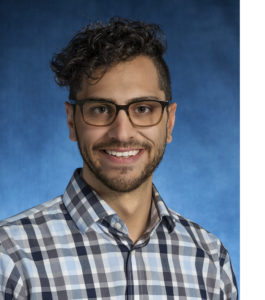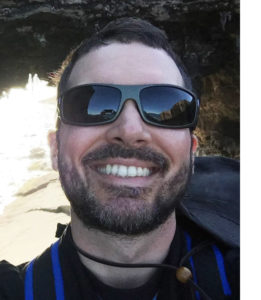 |
Corey Fulton, DVM (University of Texas Medical Branch – Galveston) Corey is a veterinarian and researcher at the University of Texas Medical Branch. He graduated from Colorado State University with his DVM in 2015, with a focus on microbiology and biocontainment. He has continued with a research focus on viral pathogenesis at UTMB. His current research focuses on the long-term effects of West Nile virus on the nervous system, using a mouse model to study behavioral and pathological effects of the virus. He plans to continue research in the field of viral pathogenesis and treatment using animal models, focusing on developing new techniques and using novel species. |
 |
Tiny Hlowke, PhD (ARC-Onderstepoort Veterinary Research) Since 2003, Tiny has been employed as a researcher and Head of Tuberculosis laboratory at the ARC-Ondertepoort Veterinary Research. In 2014, she completed her PhD in the Department of Veterinary Tropical Diseases at the Faculty of Veterinary Science of the University of Pretoria. Her interest is in the diagnosis and molecular epidemiology of tuberculosis and paratuberculosis in animal including test method development and validation. Her current research focuses on the molecular epidemiology of bovine tuberculosis in livestock and wildlife species from South Africa. During her PhD study, she evaluated different molecular typing techniques for the characterization of Mycobacterium bovis, the causative agent of bovine tuberculosis, with a view to filling the knowledge gap regarding the epidemiology of the disease in the country. This work has identified a suitable molecular typing tool for application in epidemiological studies of the disease in domestic animals and wildlife. |
 |
Gabriel Innes , VMD (John Hopkins University) Gabriel is a second-year doctoral student in the Department of Environmental Health and Engineering to pursue a PhD at the Johns Hopkins Bloomberg School of Public Health. Gabriel’s main interests involve global health at the animal, human, and environmental interface. This includes food security, zoonosis, and antibiotic resistance. Gabriel’s dissertation research is focused on infectious disease models of antimicrobial resistance in animal agriculture. Gabriel received his Bachelor in Science from the Schreyer’s Honors College at Pennsylvania State University and a Veterinariae Medicinae Doctoris (VMD) at the University of Pennsylvania School of Veterinary Medicine. Gabriel has held positions at the United States Department of Agriculture, the Food and Agriculture Organization of the United Nations and the World Health Organization HQ. |
 |
Joseph Modarelli, BS (Texas A&M University) Joseph is a PhD candidate in Genetics at Texas A&M University, and works in the molecular diagnostics section at the Texas A&M Veterinary Medical Diagnostic Laboratory (TVMDL). His work experience includes performing molecular assays for the surveillance of various pathogens that threaten agricultural animals, ranging from highly pathogenic avian influenza to foot-and-mouth disease; as well as testing to detect pathogens in ill animals or animals for export. Joseph’s current research interests focus on the development and application of molecular tools that aid in the detection of zoonotic tick-borne diseases that parasitize companion animals. His research has been applied to transboundary regions along the US-Mexico border to identify pathogens involved in the current rickettsiosis outbreak. Combined with his diagnostic experience, Joseph’s research interests led to an intellectual property disclosure of a unique diagnostic screening method that can be utilized in veterinary diagnostics and molecular prevalence studies for tick-borne pathogens. Joseph’s career goals are to apply his knowledge of genetics and his experience with high-impact animal diseases to develop more efficient and effective diagnostic tools that may be utilized in various animal health settings. |
 |
Steve Pauszek, MS, BS (USDA, ARS,, PIADC) Steve has over seventeen years of experience working on high consequence viral pathogens and zoonotics in an enhanced BSL-3. Steve’s lab skills emphasize molecular epidemiology and reverse genetics systems, in additional to clinical experiments. Steve has been a co-author on a book chapter and over 30 peer-reviewed manuscripts (5 as first author). Steve is a strong believer in the value of working with the local community to cultivate young scientists, regularly serving as a science fair judge and giving presentations to students. |
 |
Gregory Peterson, PhD (Kansas State University) Greg is a Research Assistant Professor at Kansas State University’s Biosecurity Research Institute where he instructs classes in Biosecurity to graduate students. Before his work at the BRI, he was a postdoctoral researcher at the University of Kansas (KU) where he worked on C. trachomatis and instructed undergraduate Microbiology classes. Prior to his work at the KU, he served as a microbiologist in the Laboratory Preparedness program at the Kansas Department of Health and Environment (KDHE) where he worked in the BSL-3 diagnostic laboratory on a variety of select agents, including B. anthracis, F. tularensis, Y. pestis, Burkholderia spp, and Brucella spp. Additional duties at KDHE involved running the PulseNet laboratory, which provided DNA fingerprinting data of foodborne pathogens including STEC and S. enterica to the CDC that were used in foodborne illness cluster investigations. He received his Ph.D. in Pathobiology at the Kansas State University College of Veterinary Medicine in 2011. |
 |
Erin E. Schirtzinger, PhD (USDA, ARS, ABADRU) Erin is a postdoctoral researcher in the Arthopod-borne Animal Diseases Research Unit (ABADRU) in Manhattan, Kansas. Erin’s current research is focused on the initial stages of Rift Valley fever virus infection in primary immune cells. Erin earned her PhD in Evolutionary Biology from New Mexico State University in 2011 and then worked as a post-doc at NMSU in the laboratory of Dr. Kathryn Hanley focusing on the effect of RNAi on the quasispecies diversity in dengue virus. Her research interests include emerging mosquito-borne viruses, vector and host immune responses to arbovirus infection and virus evolution at the consensus and quasispecies levels. |
 |
Fabio Vannucci, PhD (University of Minnesota) Fabio is an Assistant Professor and Diagnostician at the University of Minnesota Veterinary Diagnostic Laboratory. His research has been focused on food animal medicine with special interest in pathogenesis and development of diagnostic tools for rapid response to endemic and emerging diseases of swine. Before joining the University of Minnesota in 2015, he worked with diagnostics and bacterial pathogenesis, investigating the host adaptation and attenuation of virulence of Lawsonia intracellularis, an endemic enteric infection of swine. Since 2015, he has been led the development of serology and molecular diagnostic assays for an emerging vesicular disease in swine caused by Seneca Valley virus infection. Additionally, he has been worked on development of next generation sequencing and in situ hybridization platforms for diagnostic investigations of food animal disease |
 |
Tumen Wuliji, PhD (Lincoln University) Tumen is a research scientist and associate professor at Lincoln University of Missouri. His research focus is on screening, discovering and disease resistant marker assisted selection in small ruminants, such as genetic resistant to foot rot disease and gastrointestinal parasitic disease. He has taught various animal science courses including animal health, welfare and parasitology for animal science major and pre-veterinary students. He and his student were awarded a DHS SRT MSIs research fellowship in 2016 and completed 10 weeks’ training and research on zoonotic disease – brucellosis, and then also awarded for ‘follow on proposal’. Currently, he is experimenting on how to produce an organically raised food animals (i.e., lamb) without using antibiotics, pesticides, and anthelmintic. He is an animal scientist by training and has specialized in genetics, breeding and production for many livestock species. Before joining the faculty at Lincoln University in 2010, he held research and teaching positions at several institutes, including the University of Nevada (Reno), Langston University (OK), and NZ ministry of agriculture (NZ). He completed his undergraduate degree at Inner Mongolia Agricultural University (Inner Mongolia), his doctoral degree at University of New South Wales (Australia), and his postdoctoral training at Invermay Agricultural Research Center (NZ). |
- Home
- Training Programs
- Bench to Shop
- 2018 Trainees
